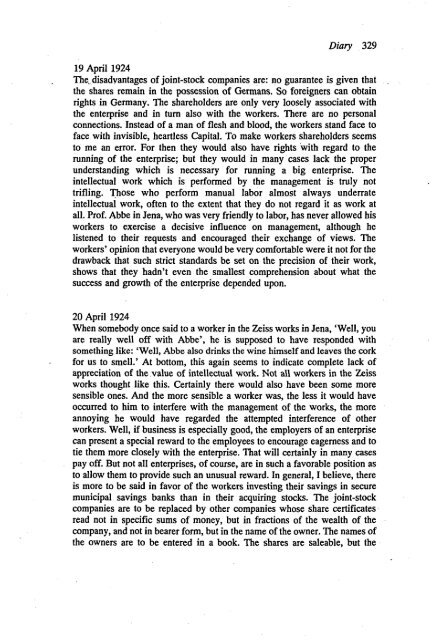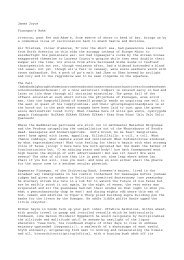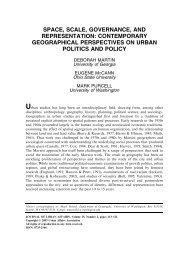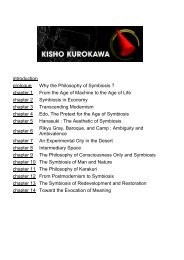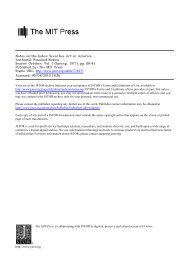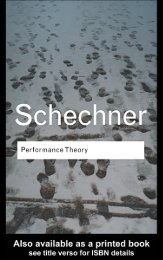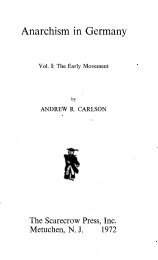Diary: Written by professor Dr Gottlob Frege in the ... - AAAARG.ORG
Diary: Written by professor Dr Gottlob Frege in the ... - AAAARG.ORG
Diary: Written by professor Dr Gottlob Frege in the ... - AAAARG.ORG
Create successful ePaper yourself
Turn your PDF publications into a flip-book with our unique Google optimized e-Paper software.
<strong>Diary</strong> 329<br />
19 April 1924<br />
The. disadvantages of jo<strong>in</strong>t-stock companies are: no guarantee is given that<br />
<strong>the</strong> shares rema<strong>in</strong> <strong>in</strong> <strong>the</strong> possession of Germans. So foreigners can obta<strong>in</strong><br />
rights <strong>in</strong> Germany. The shareholders are only very loosely associated with<br />
<strong>the</strong> enterprise and <strong>in</strong> turn also with <strong>the</strong> workers. There are no personal<br />
connections. Instead of a man of flesh and blood, <strong>the</strong> workers stand face to<br />
face with <strong>in</strong>visible, heartless Capital. To make workers shareholders seems<br />
to me an error. For <strong>the</strong>n <strong>the</strong>y would also have rights with regard to <strong>the</strong><br />
runn<strong>in</strong>g of <strong>the</strong> enterprise; but <strong>the</strong>y would <strong>in</strong> many cases lack <strong>the</strong> proper<br />
understand<strong>in</strong>g which is necessary for runn<strong>in</strong>g a big enterprise. The<br />
<strong>in</strong>tellectual work which is performed <strong>by</strong> <strong>the</strong> management is truly not<br />
trifl<strong>in</strong>g. Those who perform manual labor almost always underrate<br />
<strong>in</strong>tellectual work, often to <strong>the</strong> extent that <strong>the</strong>y do not regard it as work at<br />
all. Prof. Abbe <strong>in</strong> Jena, who was very friendly to labor, has never allowed his<br />
workers to exercise a decisive <strong>in</strong>fluence on management, although he<br />
listened to <strong>the</strong>ir requests and encouraged <strong>the</strong>ir exchange of views. The<br />
workers' op<strong>in</strong>ion that everyone would be very comfortable were it not for <strong>the</strong><br />
drawback that such strict standards be set on <strong>the</strong> precision of <strong>the</strong>ir work,<br />
shows that <strong>the</strong>y hadn't even <strong>the</strong> smallest comprehension about what <strong>the</strong><br />
success and growth of <strong>the</strong> enterprise depended upon.<br />
20 April 1924<br />
When somebody once said to a worker <strong>in</strong> <strong>the</strong> Zeiss works <strong>in</strong> Jena, 'Well, you<br />
are really well off with Abbe', he is supposed to have responded with<br />
someth<strong>in</strong>g like: 'Well, Abbe also dr<strong>in</strong>ks <strong>the</strong> w<strong>in</strong>e himself and leaves <strong>the</strong> cork<br />
for us to smell.' At bottom, this aga<strong>in</strong> seems to <strong>in</strong>dicate complete lack of<br />
appreciation of <strong>the</strong> value of <strong>in</strong>tellectual work. Not all workers <strong>in</strong> <strong>the</strong> Zeiss<br />
works thought like this. Certa<strong>in</strong>ly <strong>the</strong>re would also have been some more<br />
sensible ones. And <strong>the</strong> more sensible a worker was, <strong>the</strong> less it would have<br />
occurred to him to <strong>in</strong>terfere with <strong>the</strong> management of <strong>the</strong> works, <strong>the</strong> more<br />
annoy<strong>in</strong>g he would have regarded <strong>the</strong> attempted <strong>in</strong>terference of o<strong>the</strong>r<br />
workers. Well, if bus<strong>in</strong>ess is especially good, <strong>the</strong> employers of an enterprise<br />
can present a special reward to <strong>the</strong> employees to encourage eagerness and to<br />
tie <strong>the</strong>m more closely with <strong>the</strong> enterprise. That will certa<strong>in</strong>ly <strong>in</strong> many cases<br />
pay off. But not all enterprises, of course, are <strong>in</strong> such a favorable position as<br />
to allow <strong>the</strong>m to provide such an unusual reward. In general, I believe, <strong>the</strong>re<br />
is more to be said <strong>in</strong> favor of <strong>the</strong> workers <strong>in</strong>vest<strong>in</strong>g <strong>the</strong>ir sav<strong>in</strong>gs <strong>in</strong> secure<br />
municipal sav<strong>in</strong>gs banks than <strong>in</strong> <strong>the</strong>ir acquir<strong>in</strong>g stocks. The jo<strong>in</strong>t-stock<br />
companies are to be replaced <strong>by</strong> o<strong>the</strong>r companies whose share certificates<br />
read not <strong>in</strong> specific sums of money, but <strong>in</strong> fractions of <strong>the</strong> wealth of <strong>the</strong><br />
company, and not <strong>in</strong> bearer form, but <strong>in</strong> <strong>the</strong> name of <strong>the</strong> owner. The names of<br />
<strong>the</strong> owners are to be entered <strong>in</strong> a book. The shares are saleable, but <strong>the</strong>


